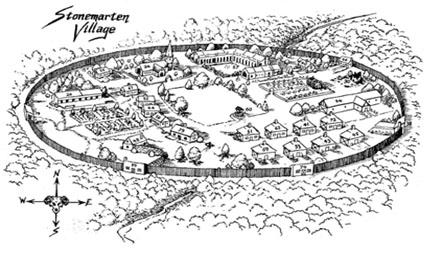IN THE SHADOW OF THE SPIRE
Now we get to the start of the actual campaign journal — the chronicling of what actually happened at the (virtual) game table.
Writing the campaign journal is actually the most time-consuming part of running a game for me. I spend more time maintaining the campaign journal than I do prepping the adventures or running them. So why do I bother?
(1) The campaign journal is an invaluble reference tool for both me and the players while the campaign is actually running. In the Shadow of the Spire, for example, started in February 2007. Events that happened in those very first sessions continue to be relevant a year and a half later. So being able to quickly reference those events is important.
(2) I have a finely tuned sense of nostalgia. Any RPG session results in a unique story created by the GM and the players. These stories don’t function particularly well as narrative constructs, but when viewed as a chronicle of events I think they can actually be quite fascinating. I have many fond memories from the gaming table and, when a campaign is all said and done, I enjoy going back to read the campaign journals and having those memories refreshed. The campaign journal may take a lot of time in its own right, but it also greatly extends the long-term enjoyment to be gleaned from the campaign.
The desire for a reference tool and the concept that a campaign journal is a chronicle of events have come to shape the format I use for my journals. Most notably, I use bullet-pointed paragraphs. This evolved out of my earlier campaign journals (which were literally just bullet-point lists of events that would read something like “Talbar went to the temple” without any kind of supporting detail; the journals were more like cheat sheets for the session designed to jog our faulty memories). But I’ve also found it to be a useful psychological trick: If I’m writing in standard paragraphs, I tend to slip into trying to structure events into a narrative. This is more difficult and time-consuming. It also tends to distort events.
(For example, when Shakespeare wrote Henry V he didn’t try to record what Henry did every day. Instead he distilled those events into a compelling narrative structure. When I’m writing a campaign journal, on the other hand, I am trying to record what the PCs did every day.)
Which brings us to the next question: How accurate is this recounting of events?
Lots of campaign journals will try to polish or jazz up what actually took place at the gaming table. Events will end up being just a little bit more dramatic; dialogue will be a little more eloquent; and everything will come off just a little bit cooler.
For the most part, I try to avoid that temptation. Partly, again, because I’m shooting for an accurate reference tool. But also because I like to humor myself into thinking that we’re plenty awesome without needing to revise the historical record.
Which isn’t to say that there isn’t an editorial process: Routine shopping trips will frequently hit the cutting room floor. Lengthy conversations will be summarized or edited down to the salient points. But virtually all of this takes the form of deciding what not to write about, rather than altering anything. Basically, if you read it in the journal than that actually happened at my gaming table.
(And even with the editorial process I’ll err on the side of conservation. If I had a nickel for every time the PCs suddenly decided to make contact with the scribe they hired 10 sessions ago… Well, I’d have a nickel. But you get the point.)
SPOILERS: It should go without saying that the journal will contain various spoilers for the Ptolus sourcebook. However, other chunks of the campaign are drawn from various published modules. When that happens, a spoiler warning identifying the source will be affixed to the top of the relevant journal entry.
PICTURES: Pictures featured in the campaign journal are almost always pillaged from other sources. Whenever possible, these pictures are hyperlinked to the original source. For example, the map of Stonemarten Village in today’s journal entry was pulled from Grailquest 2: Den of Dragons.













I’ve been reading your campaign journals (one or two before bed every night) and I am absolutely enthralled with them and what happens next! I’ve been writing up our gaming sessions (across various genres) for several years now but I really like your writing style (more of what happens versus exactly who said what) and may adapt accordingly. Your hard work on all of this has not gone unnoticed. 🙂